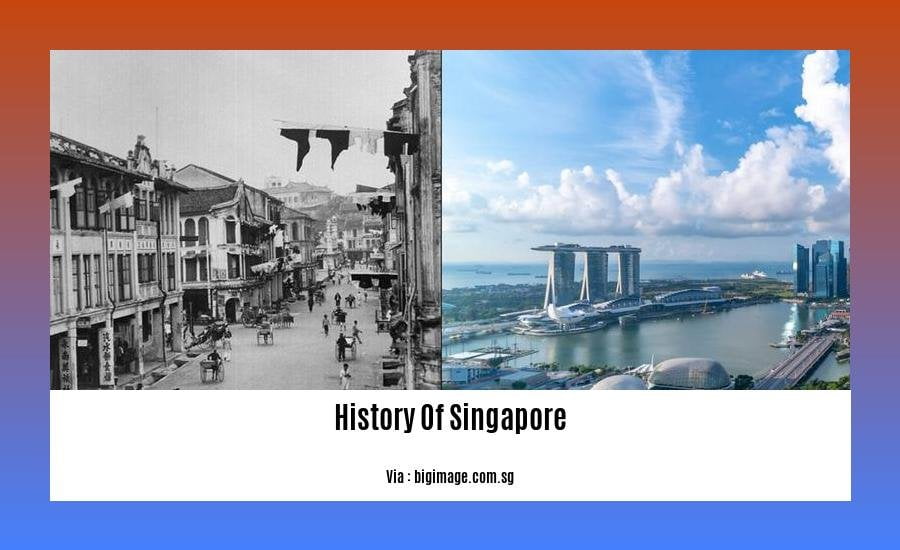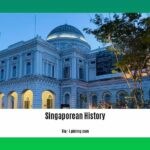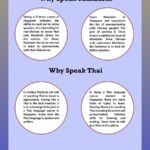Embark on “The History of Singapore: A Journey Through Time” and uncover the captivating chapters that shaped this vibrant nation. From its humble beginnings to the present day, we will explore the road to independence, the transformative effects of British acquisition, and the emergence of modern Singapore under the influence of Sir Stamford Raffles.
Key Takeaways:
- Singapore’s trading history dates back to the 14th century.
- British founded Singapore in 1819.
- Became a British Crown Colony in 1867.
- Gained independence in 1965.
- Transformed into a global hub since independence.
- Sovereign island country with a multicultural population.
- Known for its cleanliness, efficiency, and vibrant culture.
History of Singapore
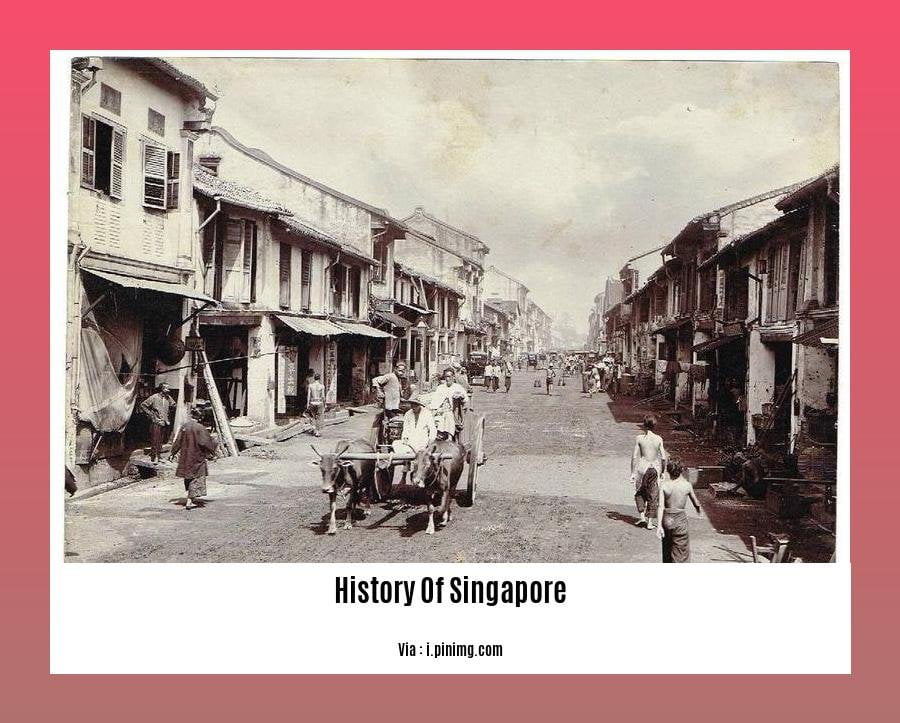
Imagine a vibrant tapestry woven with threads of ancient civilizations, colonial influences, and modern achievements. This tapestry depicts the history of Singapore, a nation that has risen from humble beginnings to become a global hub.
Ancient Roots
Singapore’s story begins centuries ago as a strategic trading post in the 14th century. Archaeological evidence reveals thriving settlements, and chroniclers from China and Java mentioned the island as a bustling commercial center.
British Influence
In 1819, Sir Stamford Raffles, a British statesman, recognized Singapore’s potential. He established a trading post that would later grow into a major port city. Singapore became a Crown Colony in 1867, shaping its legal and political systems.
Independence and Growth
Singapore’s journey to independence began in 1965 after a brief union with Malaysia. With Lee Kuan Yew as its first Prime Minister, the nation embarked on a path of rapid economic growth and modernization.
Global Hub
Today, Singapore is a thriving metropolis renowned for its skyscrapers, world-class infrastructure, and vibrant multicultural society. It’s a leading center for finance, trade, technology, and tourism, connecting Southeast Asia to the world.
Uncover the rich tapestry of Singapore’s past by exploring the captivating history of this vibrant nation. From the pioneering spirit of its early settlers to the architectural wonders that dot its modern skyline, delve into the fascinating narrative that has shaped Singapore into the extraordinary country it is today. Through the lens of singaporean history, you’ll gain an intimate understanding of the events, people, and ideas that have left an enduring mark on this island paradise.
British Acquisition
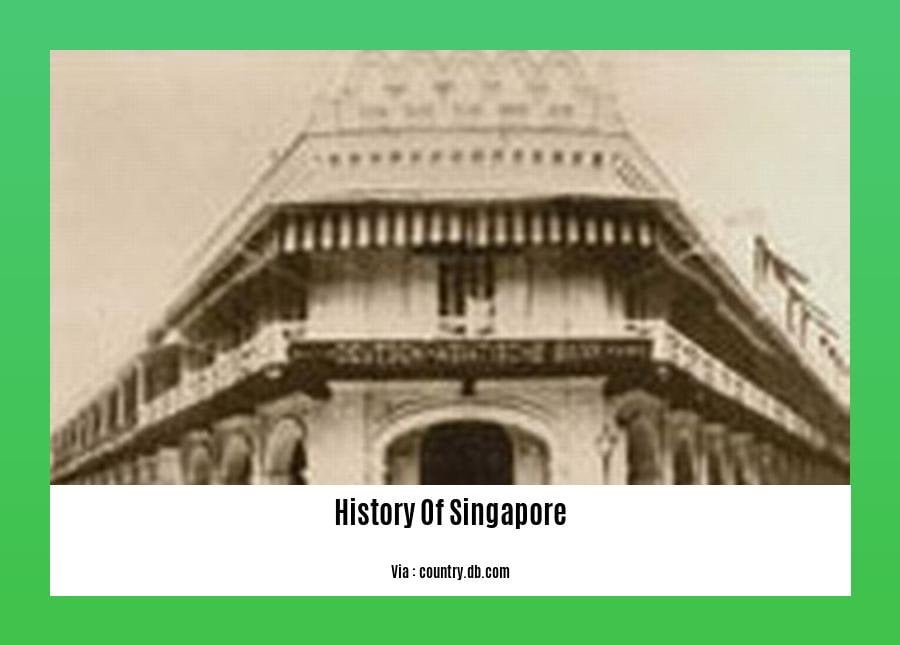
In the 19th century, the British East India Company sought to establish a trading post in Southeast Asia to counter the growing Dutch influence in the region. In 1819, Stamford Raffles, a representative of the company, negotiated a treaty with the Sultan of Johor, allowing the British to establish a settlement on the island of Singapore.
The British Acquisition marked a significant turning point in Singapore’s history. As a British colony, Singapore quickly grew into a major trading hub, benefiting from its strategic location at the crossroads of major trade routes. The British implemented a system of law and order, established a modern infrastructure, and promoted free trade, contributing to Singapore’s economic growth and development.
The British colonial period also saw the arrival of large numbers of migrants from China, India, and other parts of Southeast Asia, shaping Singapore’s multi-ethnic and multicultural society.
Key Takeaways:
- The British East India Company established a trading post in Singapore in 1819.
- Singapore became a major trading hub under British rule.
- The British implemented a system of law and order, established a modern infrastructure, and promoted free trade.
- Singapore’s multi-ethnic society was shaped by the arrival of migrants during the colonial period.
Most Relevant URL Source
Emergence of Modern Singapore: Raffles Effect
The Raffles Effect
In 1819, Sir Stamford Raffles, a British statesman, established a trading post on the island of Singapore. This marked the Emergence of Modern Singapore: Raffles Effect. Under British rule, Singapore flourished as a major port city and trading hub.
Raffles’s vision for Singapore was to create a free port that would attract traders from all over the world. He implemented a number of policies to encourage trade, including the abolition of slavery and the establishment of a free market economy. These policies attracted a large number of immigrants from China, India, and other parts of Asia.
The influx of immigrants led to the development of a vibrant and diverse society in Singapore. The city became a melting pot of cultures, and its people developed a unique Singaporean identity.
Key Takeaways:
- In 1819, Sir Stamford Raffles established a British trading post on the island of Singapore.
- Under British rule, Singapore flourished as a major port city and trading hub.
- Raffles’s policies attracted a large number of immigrants from China, India, and other parts of Asia.
- The influx of immigrants led to the development of a vibrant and diverse society in Singapore.
Citation:
- EdrawMind:
FAQ
Q1: When did Singapore become a British colony?
A1: Singapore became a British Crown colony in 1867.
Q2: Who was responsible for the establishment of modern Singapore?
A2: Sir Stamford Raffles played a crucial role in establishing modern Singapore as a British trading post in 1819.
Q3: When did Singapore gain independence from British rule?
A3: Singapore gained independence from Britain in 1965 after briefly being part of the Federation of Malaysia.
Q4: What was the impact of British rule on Singapore?
A4: British rule transformed Singapore into a major trading hub and laid the foundation for its modern economic success.
Q5: What are some of the key milestones in Singapore’s history?
A5: Key milestones include the establishment of the British trading post in 1819, the Japanese occupation during World War II, the achievement of self-governance in 1959, and independence in 1965.
- Unveiling Bernhard Caesar Einstein’s Scientific Achievements: A Legacy in Engineering - July 15, 2025
- Uncover who is Jerry McSorley: CEO, Family Man, Business Success Story - July 15, 2025
- Discover Bernhard Caesar Einstein’s Scientific Contributions: Unveiling a Legacy Beyond Einstein - July 15, 2025
